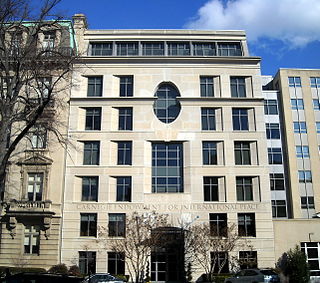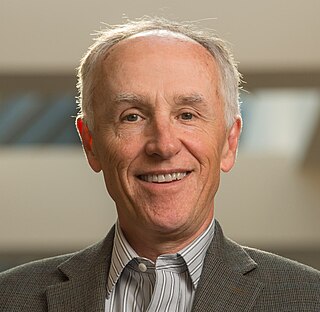Related Research Articles

A think tank, or policy institute, is a research institute that performs research and advocacy concerning topics such as social policy, political strategy, economics, military, technology, and culture. Most think tanks are non-governmental organizations, but some are semi-autonomous agencies within government or are associated with particular political parties, businesses or the military. Think-tanks are often funded by individual donations, with many also accepting government grants.

Globalization, or globalisation, is the process of interaction and integration among people, companies, and governments worldwide. The term globalization first appeared in the early 20th century, developed its current meaning some time in the second half of the 20th century, and came into popular use in the 1990s to describe the unprecedented international connectivity of the post-Cold War world. Its origins can be traced back to 18th and 19th centuries due to advances in transportation and communications technology. This increase in global interactions has caused a growth in international trade and the exchange of ideas, beliefs, and culture. Globalization is primarily an economic process of interaction and integration that is associated with social and cultural aspects. However, disputes and international diplomacy are also large parts of the history of globalization, and of modern globalization.

Merton Howard Miller was an American economist, and the co-author of the Modigliani–Miller theorem (1958), which proposed the irrelevance of debt-equity structure. He shared the Nobel Memorial Prize in Economic Sciences in 1990, along with Harry Markowitz and William F. Sharpe. Miller spent most of his academic career at the University of Chicago's Booth School of Business.

The Carnegie Endowment for International Peace (CEIP) is a nonpartisan international affairs think tank headquartered in Washington D.C., with operations in Europe, South and East Asia, and the Middle East as well as the United States. Founded in 1910 by Andrew Carnegie, the organization describes itself as being dedicated to advancing cooperation between countries, reducing global conflict, and promoting active international engagement between the United States and countries around the world. It engages leaders from multiple sectors and across the political spectrum.

David Rockefeller was an American investment banker who served as chairman and chief executive of Chase Manhattan Corporation. He was the oldest living member of the third generation of the Rockefeller family, and family patriarch from 2004 until his death in 2017. Rockefeller was the fifth son and youngest child of John D. Rockefeller Jr. and Abby Aldrich Rockefeller, and a grandson of John D. Rockefeller and Laura Spelman Rockefeller.

Sir James David Wolfensohn was an Australian-American lawyer, investment banker, and economist who served as the ninth president of the World Bank Group (1995–2005). During his tenure at the World Bank, he is credited with the focus on poverty alleviation and a rethink on development financing, earning him recognition as a banker to the world's poor. In his other roles, he is credited with actions that brought Chrysler Corporation back from the brink of bankruptcy, and also improving the finances of major United States cultural institutions, including Carnegie Hall and the Kennedy Center. He served two terms as President of the World Bank on the nomination of U.S. President Bill Clinton, and thereafter held various positions with charitable organizations and policy think-tanks including the Brookings Institution.

John Leonard Eatwell, Baron Eatwell, is a British economist who was President of Queens' College, Cambridge, from 1996 to 2020. A former senior advisor to the Labour Party, Lord Eatwell sat in the House of Lords as a non-affiliated peer from 2014 to 2020, before returning to the Labour bench.

Michael Lind is an American writer and academic. He has explained and defended the tradition of American democratic nationalism in a number of books, beginning with The Next American Nation: The New Nationalism and the Fourth American Revolution (1995). He is currently a professor at the Lyndon B. Johnson School of Public Affairs at the University of Texas at Austin.

David J. Rothkopf is a foreign policy, national security and political affairs analyst and commentator. He is the founder and CEO of TRG Media and The Rothkopf Group, a columnist for the Daily Beast and a member of the USA Today Board of Contributors. He is the author of ten books including Running the World: The Inside Story of the National Security Council and the Architects of American Power, National Insecurity: American Leadership in an Age of Fear, and most recently, Traitor: A History of American Betrayal from Benedict Arnold to Donald Trump. He is also the podcast host of Deep State Radio. Rothkopf also serves as a registered foreign agent of the United Arab Emirates.

Gar Alperovitz is an American historian and political economist. Alperovitz served as a fellow of King's College, Cambridge; a founding fellow of the Harvard Institute of Politics; a founding Fellow at the Institute for Policy Studies; a guest scholar at the Brookings Institution; and the Lionel R. Bauman Professor of Political Economy at the University of Maryland Department of Government and Politics from 1999 to 2015. He also served as a legislative director in the US House of Representatives and the US Senate and as a special assistant in the US Department of State. Alperovitz is a distinguished lecturer with the American Historical Society, co-founded the Democracy Collaborative and co-chairs its Next System Project with James Gustav Speth.

Jessica Tuchman Mathews is an American international affairs expert with a focus on climate and energy, defense and security, nuclear weapons, and conflict and governance. She was President of the Carnegie Endowment for International Peace, an international affairs think tank headquartered in Washington, D.C., with offices in five other countries, from 1997 to 2015. She has also held jobs in the Executive and Legislative branches of government, management and research in nonprofits, and journalism.

Marina von Neumann Whitman is an American economist, writer and former automobile executive. She is a professor of business administration and public policy at the University of Michigan's Ross School of Business as well as The Gerald R. Ford School of Public Policy.

David Cortright is an American scholar and peace activist. He is a Vietnam veteran who is currently Professor Emeritus and special adviser for policy studies at the Keough School of Global Affairs and Kroc Institute for International Peace Studies at the University of Notre Dame, and the author, co-author, editor or co-editor of 22 books. Cortright has a long history of public advocacy for disarmament and the prevention of war.
Robert Augustus Gardner Monks is an American author, shareholder activist, corporate governance advocate, attorney, corporate director, venture capitalist and energy company executive — as well as former political candidate and Reagan administration official.
Raymond Whitehead McDaniel, Jr. is an American financial executive. He is chairman of Moody's Corporation, the parent company of Moody's Investors Service and Moody's Analytics.

Peter P. Swire is the J.Z. Liang Chair in the School of Cybersecurity and Privacy in the College of Computing at the Georgia Institute of Technology. Swire is also Professor of Law and Ethics in the Scheller College of Business and has an appointment by courtesy with the School of Public Policy. He is an internationally recognized expert in privacy law. Swire is also a senior fellow at the Future of Privacy Forum and has served on the National Academies of Science and Engineering Forum on Cyber Resilience. During the Clinton administration, he became the first person to hold the position of Chief Counselor for Privacy in the Office of Management and Budget. In this role, he coordinated administration policy on privacy and data protection, including interfacing with privacy officials in foreign countries. He may be best known for shaping the Health Insurance Portability and Accountability Act Privacy Rule while serving as the Chief Counselor for Privacy. In November 2012 he was named as co-chair of the Tracking Protection Working Group of the World Wide Web Consortium (W3C), to attempt to mediate a global Do Not Track standard. In August 2013, President Obama named Swire as one of five members of the Director of National Intelligence Review Group on Intelligence and Communications Technologies.
This is a list of writings published by the American author Noam Chomsky.

William Edward Spriggs was an American economist who was a professor of economics at Howard University, chief economist for the AFL-CIO, and Assistant Secretary of Labor for Policy in the Obama administration from 2009 to 2012.

Ángel Cabrera Izquierdo is the 12th and current President of the Georgia Institute of Technology. Previously, he served as the President of George Mason University and of Thunderbird School of Global Management, and the former dean of IE Business School. His scholarship includes work on learning, management and leadership.
Neva Goodwin Rockefeller, known professionally as Neva Goodwin, is co-director of the Global Development And Environment Institute (GDAE) at Tufts University, where she is a research associate at the Fletcher School of Law and Diplomacy and director of the Social Science Library: Frontier Thinking in Sustainable Development and Human Well-Being.
References
- 1 2 "Biography: Jeff Faux". Economic Policy Institute. Retrieved 1 March 2012.
- ↑ Harwood, John (23 March 2009). "For Populism, a Return to Economic Roots". New York Times. Retrieved 1 March 2012.
- ↑ "Dissent Magazine". Archived from the original on 6 March 2012. Retrieved 1 March 2012.
- ↑ "American Prospect staff page". Archived from the original on 29 February 2012. Retrieved 1 March 2012.
- ↑ "Campaign for America's Future". Archived from the original on 21 January 2012. Retrieved 1 March 2012.
- ↑ "Carnegie Corporation Of New York Awards $1.5 Million To 16 "Scholars Of Vision"". Carnegie Corporation of New York. Archived from the original on 14 September 2012. Retrieved 1 March 2012.
- ↑ "Looking Ahead: Where America's Current Economic Path Will Take Us". University of New England. Retrieved 1 March 2012.[ permanent dead link ]